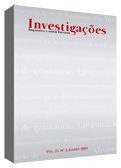Ler a sociedade em chave dialógica: amostra em discursos do Partido dos Trabalhadores (PT)
Abstract
Algumas amostras de textos do Partido dos Trabalhadores (PT) – o Manifesto oudiscurso fundador e alguns mais recentes – são analisadas em chave dialógica – a partirde unidades léxicas, associações de palavras em âmbitos semânticos e enunciados,das vozes fruto da memória social coletiva e a localização histórica e social – paraidentificar acentuações, apagamentos, deslocamentos, inclusões e exclusões,assumidos como instruções ou restrições de sentido. As análises induzem à conclusãoda perda da ênfase no horizonte de classe social e de luta de classes.References
AMOSSY, Ruth (Org.). 1999. Images de soi dans le discours: La construction de l'Ethos. Lausanne; Paris: Delachaux et Niestlé.
AUTHIER-REVUZ, Jacqueline. 2004. Entre a Transparência e a Opacidade: Um Estudo Enunciativo do Sentido. Porto Alegre: Edipucrs.
BAJTÍN, Mijail. 2004. Problemas de la Poética de Dostoievski. 1ª reimpr. Madrid: Fondo de Cultura Económica.
BAKHTIN, M. 1998. Questões de Literatura e de Estética: a Teoria do Romance. 4ed. São Paulo: Unesp.
______. 2000. Estética da Criação Verbal. São Paulo: Martins Fontes.
______.; VOLOCHINOV. 1979. O Marxismo e a Filosofia da Linguagem. São Paulo: Hucitec.
CHARAUDEAU, Patrick. 2006. Discurso Político. São Paulo: Contexto.
CLARK, Katerina; HOLQUIST, Michel. 1998. Mikail Bakhtin. Tradução: J.
Guinsburg. São Paulo: Perspectiva.
DUCROT, Oswald. 1986. El Decir y lo Dicho: Polifonía de la Enunciación. Barcelona: Paidos.
CRYSTAL, David. 1988. Dicionário de Linguística e Fonética. Rio de Janeiro: Zahar.
ESPAR, María Teresa. 1994. El discurso o la Polifonía de un Término. Lengua y Habla. Revista del CIAL, Mérida – Venezuela.
FARACO, Carlos Alberto. (1991). O Dialogismo como Chave de uma Antropologia Filosófica. (versão mimeo)
FRANÇOIS, Frédéric. 1998. Le Discours et ses Entours: Essai sur l’Interprétation. Paris: Montréal.
______. 2003. Linguistique de la Langue et Dialogue avec les Textes: un Point de Vue. In: Revue de la Societé Int. de Linguistique Fonctionelle, nº 39 (2):61-74.
GEERTZ, Clifford. 2003. La interpretación de las Culturas. Barcelona: Gedisa.
GONZÁLEZ, Luis. 2001. Teoría Linguística y Enseñanza de la Lengua. (Linguística para Profesores). Madrid: Cátedra. 392p.
KERBRAT-ORECCHIONI, Catherine. 1980. L’Énontiation de la Subjetivité dans le Langage. Paris: Armand Colin.
LOZANO, Jorge; PEÑA, Cristina; MARÍN, Gonzalo Abril. 1999. Análisis del
Discurso: Hacia una Semiótica de la Interación Textual. Madrid: Cátedra. 253p.
MAINGUENEAU, Dominique. 2005. Gênese dos Discursos. Curitiba: Criar.
p.
______. 2006. Cenas da Enunciação. Curitiba: Criar.
MOIRAND, Sophie. 2000. Du Traitement Different de L’intertexte selon les Genres Convoquées: dans les Événements Scientifiques à Caractere Politique. Revue de Sémio-linguistique des textes et discours. Université Paris 3. v. 13.
______. 2005. Le Dialogisme, entre Problématiques Énonciatives et Théories Discursives. In: Cashiers de Praxématique 43. Université de Montpellier 3, junho, p.189-220.
NEGRONI, María Marta García; COLADO, Marta Tordesillas. 2001. La
Enunciación en la Lengua. Madrid: Gredos.
NÚNEZ, Rafael; TESO, Enrique del. 1966. Semántica y Pragmática del Texto Común. Madrid: Cátedra. 335p.
ORLANDI, Eni P. 1993. Discurso Fundador. Campinas: Pontes. p.11-25.
PARTIDO DOS TRABALHADORES. Disponível em: www.pt.org.br/sitept/
index_files/arquivos.php. Acessado em: 01/10/07.
______. 2005. Resoluções de Encontros e Congressos & Programas de Governo: 1979-2002. São Paulo: Bartira. 62p. Com CD-Rom.
Downloads
Published
How to Cite
Issue
Section
License
Copyright (c) 2015 Miguel Espar Argerich

This work is licensed under a Creative Commons Attribution 4.0 International License.
Authors who publish with Revista Investigações agree to the following terms:
Authors retain copyright and grant the journal right of first publication with the work simultaneously licensed under the Creative Commons Attribution 4.0 International (CC BY 4.0) license that allows others to share the work with an acknowledgement of the work's authorship and initial publication in this journal.
Authors are able to enter into separate, additional contractual arrangements for the non-exclusive distribution of the journal's published version of the work (e.g., post it to an institutional repository or publish it in a book), with an acknowledgement of its initial publication in this journal.
You are free to:
Share — copy and redistribute the material in any medium or format for any purpose, even commercially.
Adapt — remix, transform, and build upon the material for any purpose, even commercially.
The licensor cannot revoke these freedoms as long as you follow the license terms.
Under the following terms:
Attribution — You must give appropriate credit , provide a link to the license, and indicate if changes were made . You may do so in any reasonable manner, but not in any way that suggests the licensor endorses you or your use.
No additional restrictions — You may not apply legal terms or technological measures that legally restrict others from doing anything the license permits.

